
This is a corrected version of the article that appeared in print.
Am Fam Physician. 2011;83(4):429-436
A more recent article on primary care for refugees is available.
Related letter: Screening Tests for Parasites in Refugees
Author disclosure: Nothing to disclose.
Over the past decade, at least 600,000 refugees from more than 60 different countries have been resettled in the United States. The personal history of a refugee is often marked by physical and emotional trauma. Although refugees come from many different countries and cultures, their shared pattern of experiences allows for some generalizations to be made about their health care needs and challenges. Before being accepted for resettlement in the United States, all refugees must pass an overseas medical screening examination, the purpose of which is to identify conditions that could result in ineligibility for admission to the United States. Primary care physicians have the opportunity to care for members of this unique population once they resettle. Refugees present to primary care physicians with a variety of health problems, including musculoskeletal and pain issues, mental and social health problems, infectious diseases, and longstanding undiagnosed chronic illnesses. Important infectious diseases to consider in the symptomatic patient include tuberculosis, parasites, and malaria. Health maintenance and immunizations should also be addressed. Language barriers, cross-cultural medicine issues, and low levels of health literacy provide additional challenges to caring for this population. The purpose of this article is to provide primary care physicians with a guide to some of the common issues that arise when caring for refugee patients.
Throughout history, persons have been forced to flee their homes because of war, famine, or persecution. In 1951, in an effort to protect European refugees in the aftermath of World War II, the United Nations developed an official definition of “refugee,” which has since been called the Geneva convention. A 1967 United Nations Protocol removed the geographic and time boundaries from the original definition. Today, the United Nations defines a refugee as anyone who:
Over the past decade, at least 600,000 refugees from more than 60 different countries have been resettled in the United States.2 Table 1 lists the top 10 countries of origin for refugees arriving in the United States from 2000 to 2009, and Table 2 shows the distribution of those refugees resettled in each state or territory.2
| Clinical recommendation | Evidence rating | References |
|---|---|---|
| Physicians should focus on addressing refugees' postmigration resettlement challenges (e.g., housing, employment, social isolation) rather than directing therapies at healing past traumas. | C | 10, 13, 14, 18 |
| Refugees presenting with abdominal symptoms, hematuria, or failure to thrive should be assessed for parasites. | C | 19, 21 |
| Refugees from malaria-endemic areas presenting with fatigue, pallor, hematologic abnormalities, and possibly an enlarged spleen should be evaluated for malaria. | C | 19 |
| Physicians who accept federal payers should provide language translation services for refugees who need them, as required by federal law. | C | 23 |
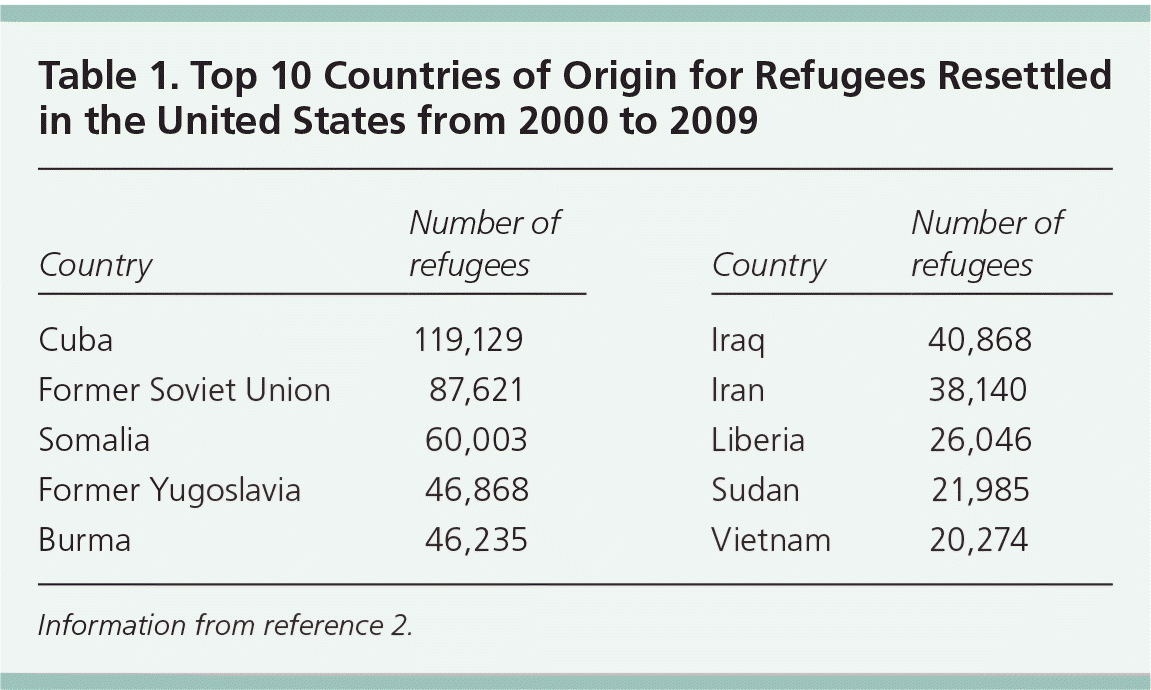
| Country | Number of refugees |
|---|---|
| Cuba | 119,129 |
| Former Soviet Union | 87,621 |
| Somalia | 60,003 |
| Former Yugoslavia | 46,868 |
| Burma | 46,235 |
| Iraq | 40,868 |
| Iran | 38,140 |
| Liberia | 26,046 |
| Sudan | 21,985 |
| Vietnam | 20,274 |
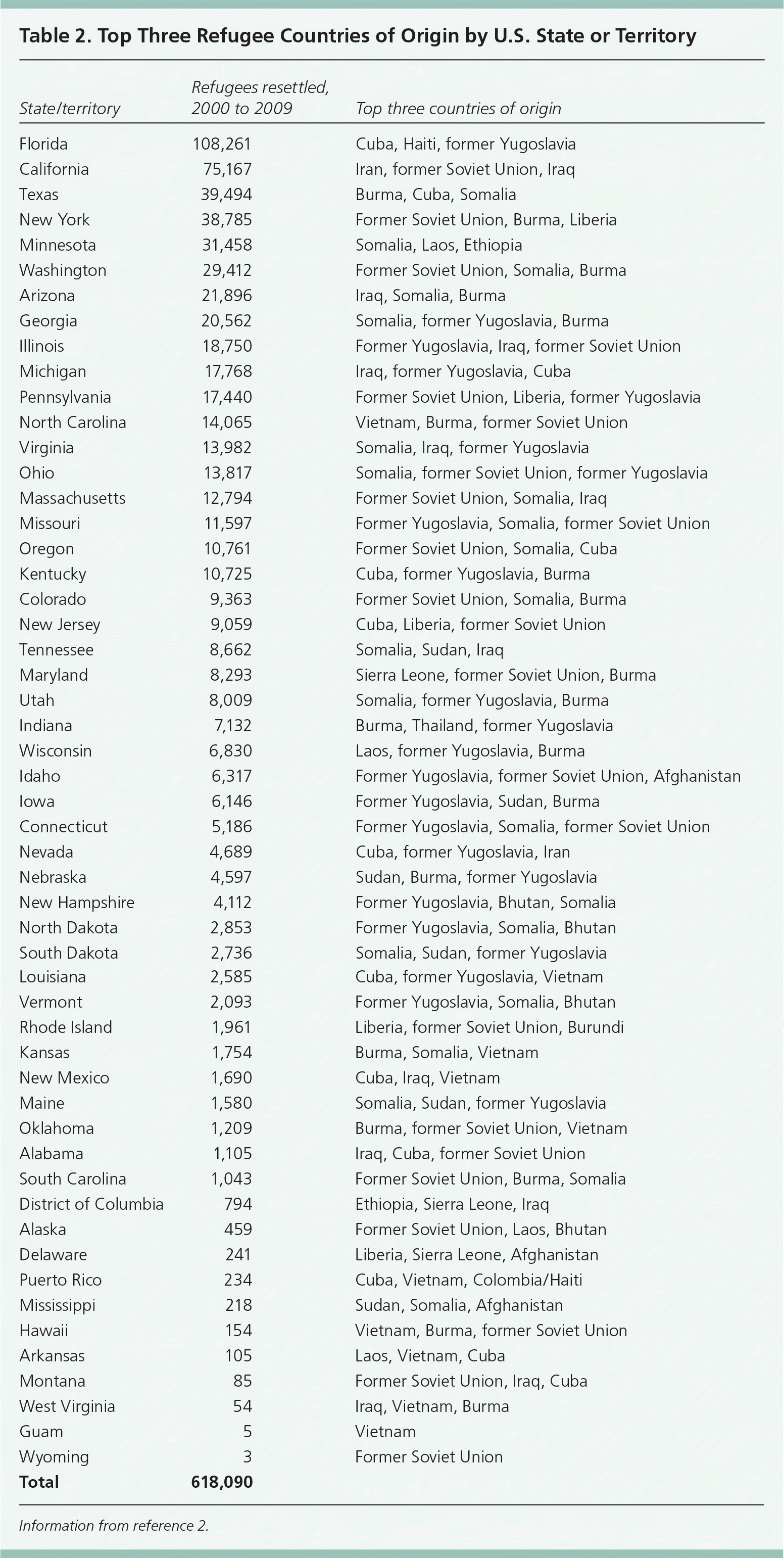
| State/territory | Refugees resettled, 2000 to 2009 | Top three countries of origin |
|---|---|---|
| Florida | 108,261 | Cuba, Haiti, former Yugoslavia |
| California | 75,167 | Iran, former Soviet Union, Iraq |
| Texas | 39,494 | Burma, Cuba, Somalia |
| New York | 38,785 | Former Soviet Union, Burma, Liberia |
| Minnesota | 31,458 | Somalia, Laos, Ethiopia |
| Washington | 29,412 | Former Soviet Union, Somalia, Burma |
| Arizona | 21,896 | Iraq, Somalia, Burma |
| Georgia | 20,562 | Somalia, former Yugoslavia, Burma |
| Illinois | 18,750 | Former Yugoslavia, Iraq, former Soviet Union |
| Michigan | 17,768 | Iraq, former Yugoslavia, Cuba |
| Pennsylvania | 17,440 | Former Soviet Union, Liberia, former Yugoslavia |
| North Carolina | 14,065 | Vietnam, Burma, former Soviet Union |
| Virginia | 13,982 | Somalia, Iraq, former Yugoslavia |
| Ohio | 13,817 | Somalia, former Soviet Union, former Yugoslavia |
| Massachusetts | 12,794 | Former Soviet Union, Somalia, Iraq |
| Missouri | 11,597 | Former Yugoslavia, Somalia, former Soviet Union |
| Oregon | 10,761 | Former Soviet Union, Somalia, Cuba |
| Kentucky | 10,725 | Cuba, former Yugoslavia, Burma |
| Colorado | 9,363 | Former Soviet Union, Somalia, Burma |
| New Jersey | 9,059 | Cuba, Liberia, former Soviet Union |
| Tennessee | 8,662 | Somalia, Sudan, Iraq |
| Maryland | 8,293 | Sierra Leone, former Soviet Union, Burma |
| Utah | 8,009 | Somalia, former Yugoslavia, Burma |
| Indiana | 7,132 | Burma, Thailand, former Yugoslavia |
| Wisconsin | 6,830 | Laos, former Yugoslavia, Burma |
| Idaho | 6,317 | Former Yugoslavia, former Soviet Union, Afghanistan |
| Iowa | 6,146 | Former Yugoslavia, Sudan, Burma |
| Connecticut | 5,186 | Former Yugoslavia, Somalia, former Soviet Union |
| Nevada | 4,689 | Cuba, former Yugoslavia, Iran |
| Nebraska | 4,597 | Sudan, Burma, former Yugoslavia |
| New Hampshire | 4,112 | Former Yugoslavia, Bhutan, Somalia |
| North Dakota | 2,853 | Former Yugoslavia, Somalia, Bhutan |
| South Dakota | 2,736 | Somalia, Sudan, former Yugoslavia |
| Louisiana | 2,585 | Cuba, former Yugoslavia, Vietnam |
| Vermont | 2,093 | Former Yugoslavia, Somalia, Bhutan |
| Rhode Island | 1,961 | Liberia, former Soviet Union, Burundi |
| Kansas | 1,754 | Burma, Somalia, Vietnam |
| New Mexico | 1,690 | Cuba, Iraq, Vietnam |
| Maine | 1,580 | Somalia, Sudan, former Yugoslavia |
| Oklahoma | 1,209 | Burma, former Soviet Union, Vietnam |
| Alabama | 1,105 | Iraq, Cuba, former Soviet Union |
| South Carolina | 1,043 | Former Soviet Union, Burma, Somalia |
| District of Columbia | 794 | Ethiopia, Sierra Leone, Iraq |
| Alaska | 459 | Former Soviet Union, Laos, Bhutan |
| Delaware | 241 | Liberia, Sierra Leone, Afghanistan |
| Puerto Rico | 234 | Cuba, Vietnam, Colombia/Haiti |
| Mississippi | 218 | Sudan, Somalia, Afghanistan |
| Hawaii | 154 | Vietnam, Burma, former Soviet Union |
| Arkansas | 105 | Laos, Vietnam, Cuba |
| Montana | 85 | Former Soviet Union, Iraq, Cuba |
| West Virginia | 54 | Iraq, Vietnam, Burma |
| Guam | 5 | Vietnam |
| Wyoming | 3 | Former Soviet Union |
| Total | 618,090 |
A refugee's personal history is often marked by trauma, torture, loss of family and friends, and the trials of resettlement in a new country and orientation to a new culture. Although refugees come from many different countries and cultures, their shared pattern of experiences allows for some generalizations to be made about their health care needs and challenges. The purpose of this article is to provide primary care physicians with a guide to some of the common issues that arise when caring for refugees.
Initial Medical Screening Examination
Before being accepted for resettlement into the United States, all refugees must pass the overseas medical screening examination performed by panel physicians under the technical oversight of the Centers for Disease Control and Prevention (CDC), with the goal of detecting class A and B conditions3 (Table 34). The CDC further recommends, but does not mandate, an initial domestic screening examination, the purpose of which is to further identify medical conditions that pose a public health risk or that might interfere with successful resettlement. 5 Several documents on the CDC Web site provide guidance as to the components of an initial history, physical examination, and laboratory assessment (http://www.cdc.gov/immigrantrefugeehealth/guidelines/domestic/domestic-guidelines.html).6 Each state develops its own protocol for completing the initial medical examination, which often is performed by a combination of local health department and private physicians.
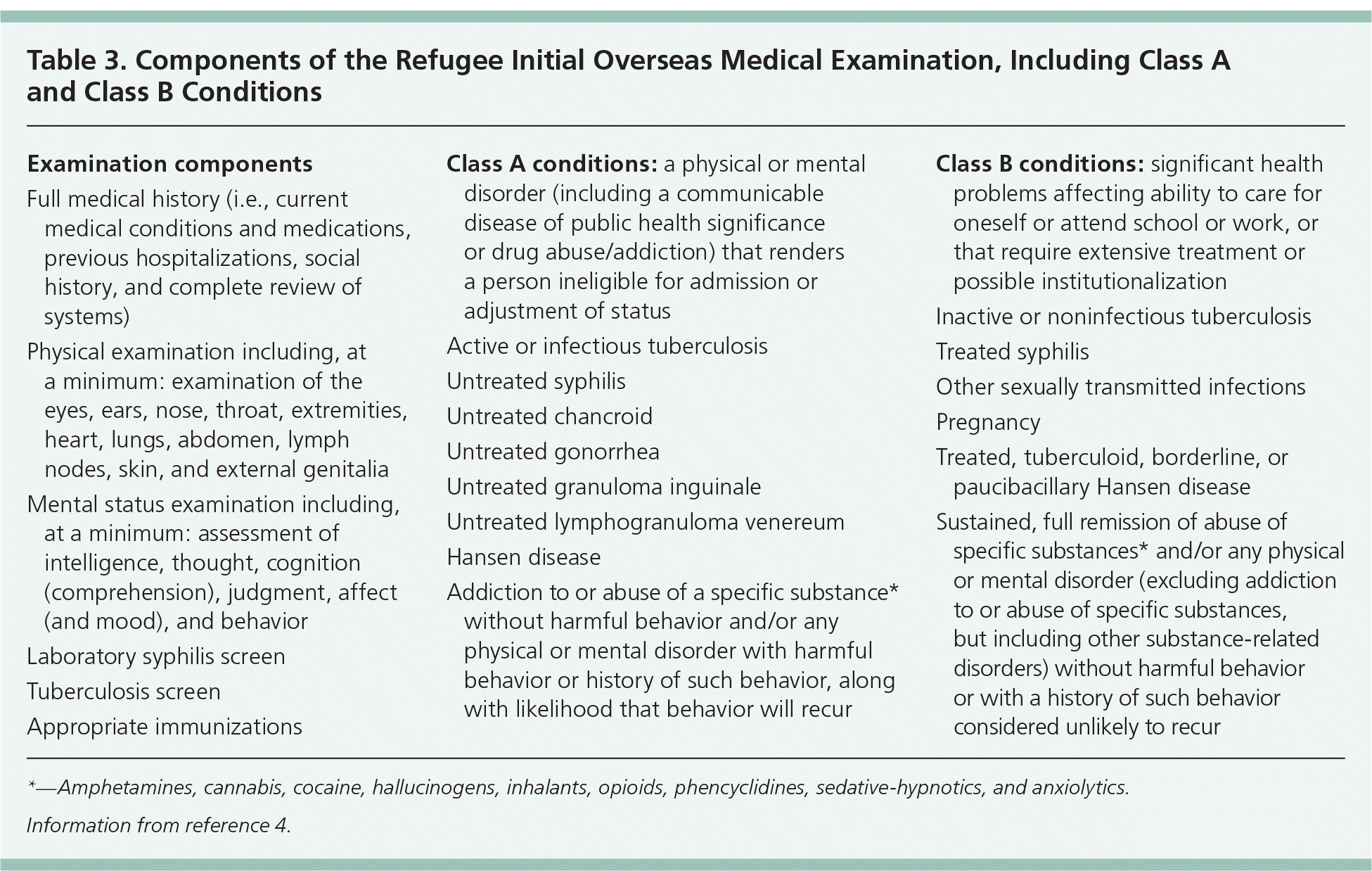
| Examination components |
| Full medical history (i.e., current medical conditions and medications, previous hospitalizations, social history, and complete review of systems) |
| Physical examination including, at a minimum: examination of the eyes, ears, nose, throat, extremities, heart, lungs, abdomen, lymph nodes, skin, and external genitalia |
| Mental status examination including, at a minimum: assessment of intelligence, thought, cognition (comprehension), judgment, affect (and mood), and behavior |
| Laboratory syphilis screen |
| Tuberculosis screen |
| Appropriate immunizations |
| Class A conditions: a physical or mental disorder (including a communicable disease of public health significance or drug abuse/addiction) that renders a person ineligible for admission or adjustment of status |
| Active or infectious tuberculosis |
| Untreated syphilis |
| Untreated chancroid |
| Untreated gonorrhea |
| Untreated granuloma inguinale |
| Untreated lymphogranuloma venereum |
| Hansen disease |
| Addiction to or abuse of a specific substance* without harmful behavior and/or any physical or mental disorder with harmful behavior or history of such behavior, along with likelihood that behavior will recur |
| Class B conditions: significant health problems affecting ability to care for oneself or attend school or work, or that require extensive treatment or possible institutionalization |
| Inactive or noninfectious tuberculosis |
| Treated syphilis |
| Other sexually transmitted infections |
| Pregnancy |
| Treated, tuberculoid, borderline, or paucibacillary Hansen disease |
| Sustained, full remission of abuse of specific substances* and/or any physical or mental disorder (excluding addiction to or abuse of specific substances, but including other substance-related disorders) without harmful behavior or with a history of such behavior considered unlikely to recur |
Common Presenting Problems
Refugees present to primary care physicians with a variety of health problems. The most common are musculoskeletal and pain issues, mental and social health problems, infectious diseases, and longstanding undiagnosed chronic conditions (Table 4).
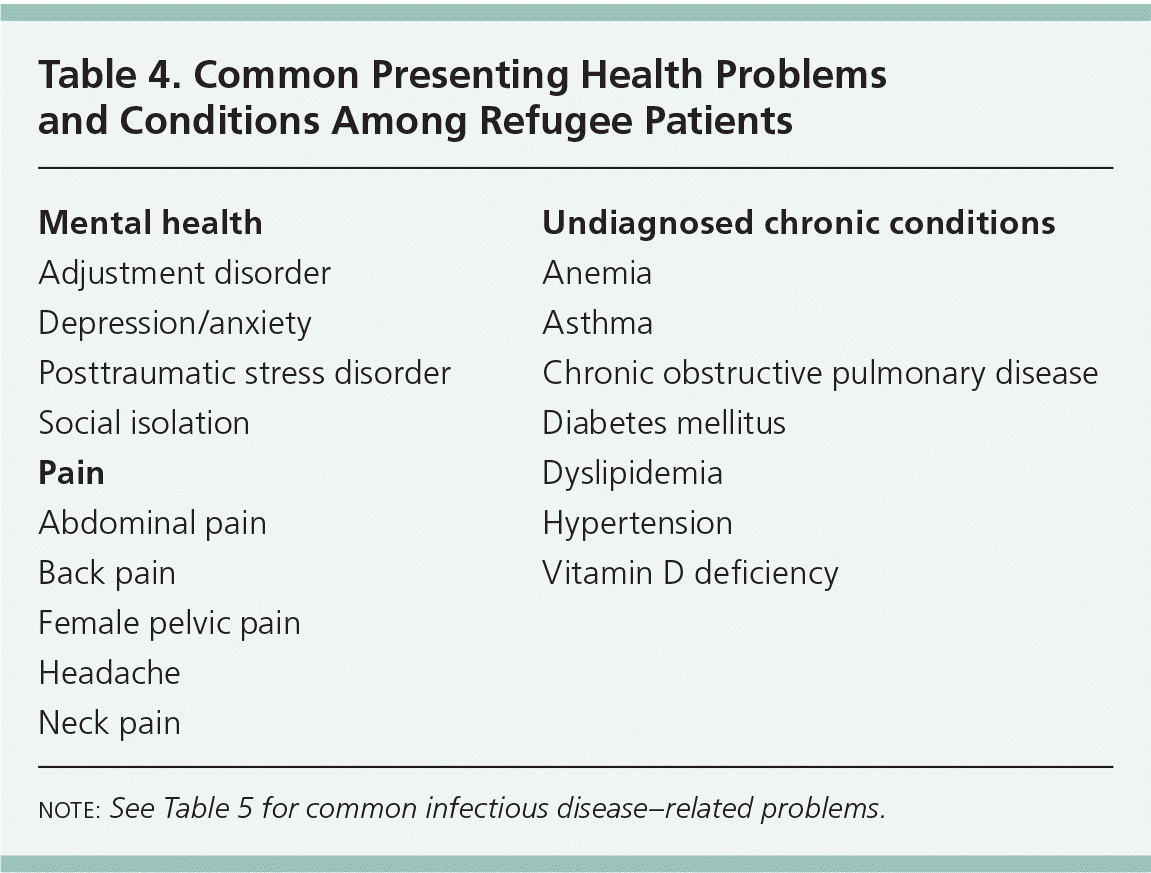
| Mental health |
| Adjustment disorder |
| Depression/anxiety |
| Posttraumatic stress disorder |
| Social isolation |
| Pain |
| Abdominal pain |
| Back pain |
| Female pelvic pain |
| Headache |
| Neck pain |
| Undiagnosed chronic conditions |
| Anemia |
| Asthma |
| Chronic obstructive pulmonary disease |
| Diabetes mellitus |
| Dyslipidemia |
| Hypertension |
| Vitamin D deficiency |
MUSCULOSKELETAL AND PAIN ISSUES
Many refugees seek medical attention for musculoskeletal pain, most commonly of the neck and lower back.7–9 Contributing factors (e.g., past physical trauma), current employment in jobs involving physical labor (e.g., housekeeping, factory work), and difficult living conditions (e.g., sleeping on floors or couches) must be considered in the assessment and treatment plan.
Chronic headaches are another common pain issue, as is ill-defined, whole body pain. Pain in the abdomen and pelvis is more common in women.7–9 Organic causes for abdominal, pelvic, and whole body pain are often difficult to identify despite extensive workups, which should include assessment for Helicobacter pylori, intestinal parasites, and vitamin D deficiency, and imaging as indicated.10–12
MENTAL AND SOCIAL HEALTH
It is not surprising that refugees, given their often traumatic pasts, have higher rates of depression, anxiety, and posttraumatic stress disorders than the general population. 8,13–15 Postmigration resettlement stressors, such as social isolation, financial problems, generational acculturation differences, culture shock, employment difficulty, disability issues, and housing issues, also adversely affect refugees' mental and physical health.10,13,14,16–18
The relative contribution of pre- versus postmigration stress to the development and maintenance of mental health disorders is unknown. Many experts emphasize the importance of addressing refugees' postmigration resettlement challenges (e.g., housing, employment, social isolation) rather than directing therapies at healing past traumas.13,16–18 When possible, these patients should be referred to local community agencies that can assist them with their social needs.
INFECTIOUS DISEASES
Although many physicians think of infectious diseases when dealing with refugees, other diagnoses such as musculoskeletal pain and mental health issues are actually more prevalent.7 Because refugees are such a tightly controlled population, with preand postmigration screening for and prophylactic treatment of infectious diseases, they account for less international spread of infectious diseases than international travelers and other migrant populations.3
Patients presenting with abdominal symptoms, hematuria, or failure to thrive should be assessed for parasites19,21 (Table 53,19,20). At times, the only sign of a parasitic infection may be an asymptomatic eosinophilia. Although collection and analysis of multiple stool samples are a common way to assess for the presence of parasites, negative results do not rule out parasitic infection, and serologic testing for antibodies may be necessary. If such infection is suspected, consultation with an infectious disease expert can be helpful.19,21
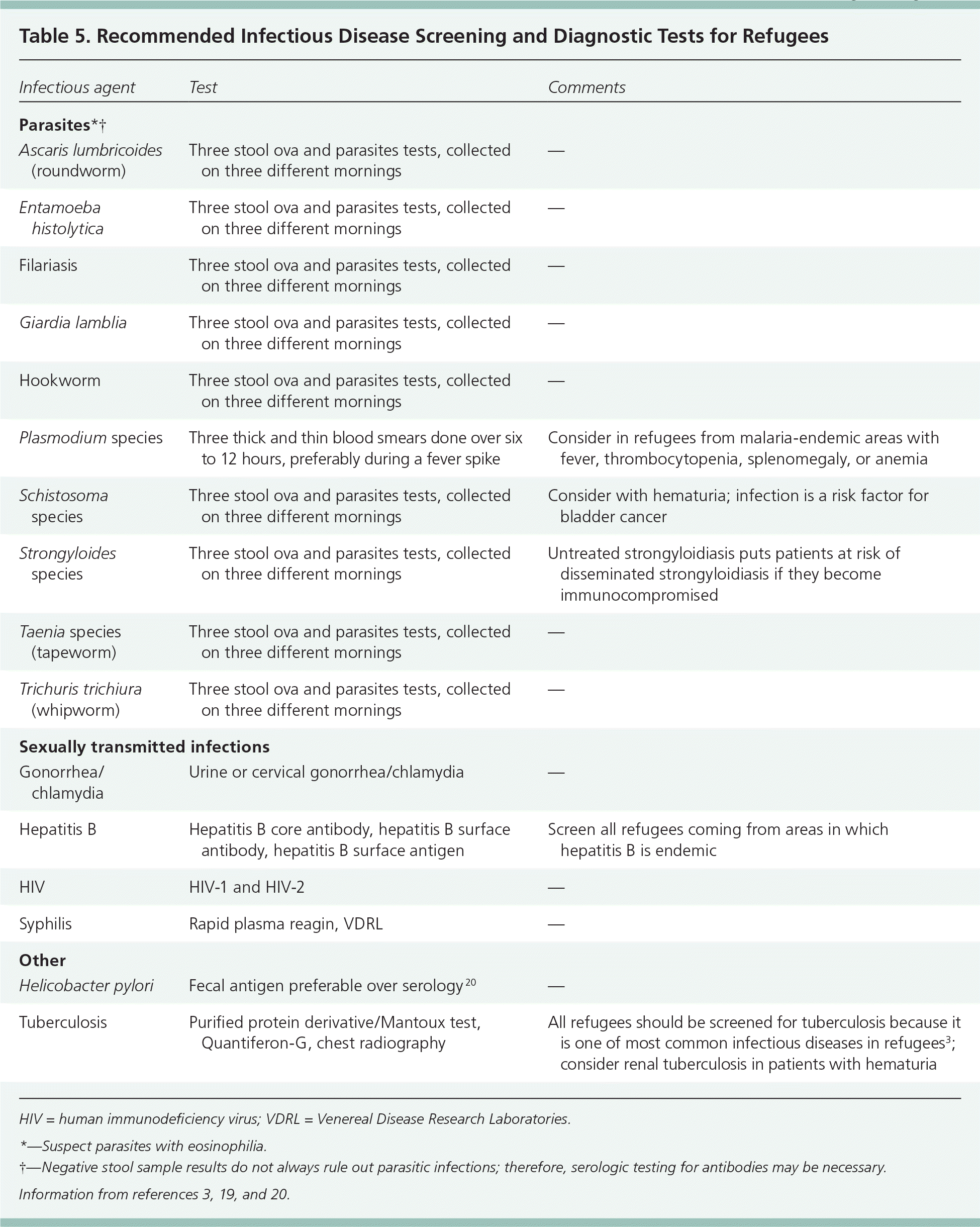
| Infectious agent | Test | Comments |
|---|---|---|
| Parasites*† | ||
| Ascaris lumbricoides (roundworm) |
| — |
| Entamoeba histolytica | ||
| Filariasis | ||
| Giardia lamblia | ||
| Hookworm | ||
| Taenia species (tapeworm) | ||
| Trichuris trichiura (whipworm) | ||
| Plasmodium species |
| Consider in refugees from malaria-endemic areas with fever, thrombocytopenia, splenomegaly, or anemia |
| Schistosoma species |
| Consider in refugees from sub-Saharan Africa, especially if hematuria is present; infection is risk factor for bladder cancer |
| Strongyloides species |
| Untreated strongyloidiasis puts patients at risk of disseminated strongyloidiasis if they become immunocompromised |
| Sexually transmitted infections | ||
| Gonorrhea/chlamydia |
| — |
| Hepatitis B |
| Screen all refugees coming from areas in which hepatitis B is endemic |
| HIV |
| — |
| Syphilis |
| All refugees 15 years and older should be screened for syphilis |
| Other | ||
| Helicobacter pylori |
| — |
| Tuberculosis |
| All refugees should be screened for tuberculosis because it is one of the most common infectious diseases in refugees3; consider renal tuberculosis in patients with hematuria |
Malaria remains endemic in sub-Saharan Africa, south Asia, Asia, and some areas of the Middle East. Refugees from endemic areas presenting with fatigue, pallor, hematologic abnormalities, and possibly an enlarged spleen should be evaluated for malaria.19
UNDIAGNOSED COMMON CHRONIC CONDITIONS
In addition to the special health considerations described above, refugees have the same common chronic conditions as non-refugee patients, such as diabetes mellitus, hypertension, hyperlipidemia, and asthma.9 Depending on the health care available to refugees in their country of origin or their host country (where refugees sometimes spend up to 20 years in refugee camps before coming to the United States), these conditions may or may not have been diagnosed and managed before these patients arrived in the United States.
Health Maintenance and Immunizations
Health care maintenance screening guidelines, such as cervical cancer screening, mammography, and colonoscopy, should be used with refugee patients, just as with nonrefugee patients. In addition, refugees often present for an appointment only to request necessary immunizations. The U.S. Immigration and Naturalization Service has determined that vaccinations are not mandatory for refugees on entry to the United States. However, they become mandatory one year after arrival, when these persons are applying for adjustment of status to legal permanent resident. Table 6 lists the CDC-mandated immunizations for all immigrants and refugees requesting adjustment of status for U.S. permanent residence.22
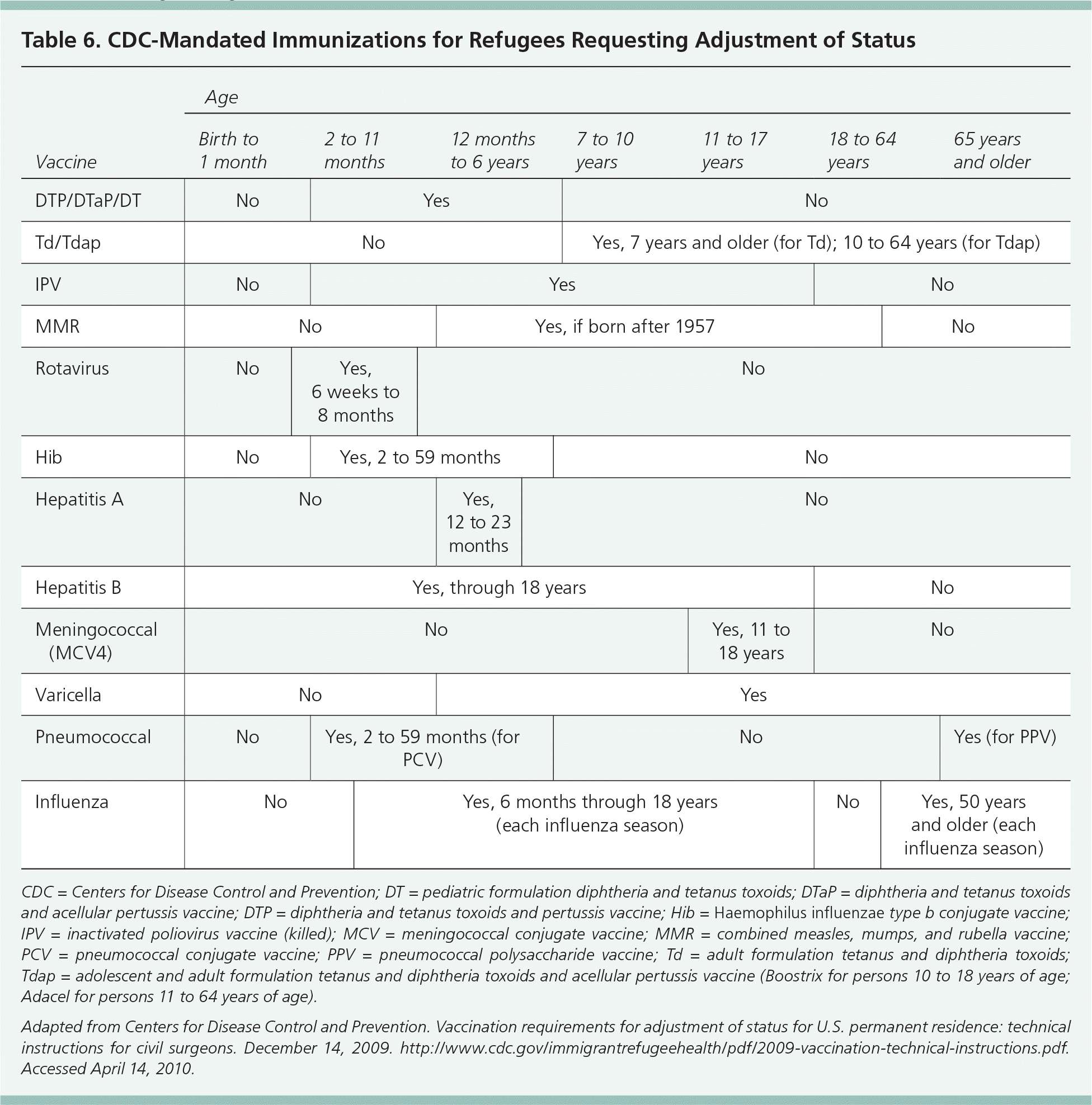
Special Challenges
LANGUAGE BARRIERS
Use of qualified translators is essential to caring for refugee patients. Refugees are not required to bring their own translator to an appointment, and federal law mandates that physicians who accept patients with federal payers must provide language translation to all of their patients who require it.23 In most cases, insurance plans will pay for the translation services, but it is the responsibility of the physician's office to make arrangements for the provision of those services.
CROSS-CULTURAL MEDICINE
Western notions of body, health, and illness are often different from those of other cultures, as are perceived roles of patients, physicians, and medications. For example, some Somalis expect physicians to know what is wrong with them without needing to ask any questions, and may also expect medications and a cure.24 A previous article in American Family Physician summarized some of the common beliefs of certain large refugee groups (https://www.aafp.org/afp/2005/1201/p2267.html). Familiarizing oneself with some general principles of a refugee's culture can be useful, but care must be taken not to stereotype persons within any group. An alternative and possibly more feasible approach may be to adopt and practice “cultural humility,” exploring similarities and differences between oneself and each patient encountered, rather than learning the details of each culture.25
HEALTH SYSTEM LITERACY
Refugees' health literacy levels are typically very low. For example, many refugees do not understand the concept of medication refills. Often, they will finish a bottle of medication that is intended to be refilled and used long-term, thinking the treatment is complete, or think they need to return to the physician's office for more medication. Many also do not understand the distinction between primary care and other subspecialties. As a result, they may not schedule or keep an appointment with a subspecialist referral, but rather return to their primary care physician, whom they view as “their doctor.”
Lack of transportation or ability to schedule the appointment with the subspecialist further contributes to poor compliance with subspecialist referrals.26 The notion of set appointment times may also be unfamiliar to refugees, because many experienced previous systems in which they just showed up and waited their turn to see the physician.
Finally, many refugees do not understand the U.S. health insurance process. In states in which Medicaid requires reapplication on a biannual or annual basis, many refugees have a lapse in insurance coverage because they missed the reapplication deadline. A previous article on medical care for refugees and immigrants in American Family Physician provides some further insight into additional challenges refugees may face (https://www.aafp.org/afp/980301ap/gavagan.html).
